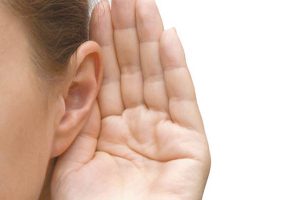August 1, 2024
Ask the Audiologist
 By Kevin Kock, Au.D.
By Kevin Kock, Au.D.
Audiology Consultants, P.C.
What Happens When I Get My Hearing Tested?
When people think about how well they hear, they may have trouble describing it. As an audiologist who works with people with hearing loss every day, I work with them to describe their situation and find solutions to help them.
Often, I hear people say, “I hear people, but I cannot understand them, especially in background noise.” They might also have family or loved ones suggest they should have their hearing tested. This is usually because the TV is too loud, or they ask people to repeat themselves. If these scenarios sound like you, a hearing evaluation (hearing test) may be needed.
Some people also like to have a baseline hearing test to track changes over time, even if they do not have concerns. This is especially recommended for people who work around loud sounds or adults over age 60 who are more at risk of hearing loss.
 A hearing evaluation is a comprehensive assessment of your ears and how they process sound. It is recommended to see a licensed Audiologist for this testing because they are trained specifically to address hearing loss that affects communication. An audiologist is a master’s or doctorate-level professional who specializes in hearing health and hearing care.
A hearing evaluation is a comprehensive assessment of your ears and how they process sound. It is recommended to see a licensed Audiologist for this testing because they are trained specifically to address hearing loss that affects communication. An audiologist is a master’s or doctorate-level professional who specializes in hearing health and hearing care.
During a hearing evaluation, the audiologist will often put you into a sound booth to reduce outside noise and make sure you get accurate results. Then, they will ask about your medical history and any issues you may have to get a better picture of your hearing. They will also look in your ears to see if there is any wax and to see how your eardrum looks.
Next, the audiologist will put calibrated headphones or earbuds in your ears and start a series of tests to see how your hearing system functions and detect any potential hearing-related issues. This includes testing the sensitivity of hearing across different frequencies as well as speech testing to see how well your brain processes sound. They may even do tests in background noise to see how well you do. All these tests, along with your case history, are looked at to see the level of hearing and type of hearing loss.
Depending on your needs and type of hearing loss, they may add other testing to check the health of your eardrum and middle ear.
The evaluation usually takes about 30 minutes, though longer may be scheduled to give ample time to discuss your situation, share results, and answer your questions. The results will be shared with you right after testing, and you can ask for a copy of the results for your own records.
When patients come in, they may feel stressed about getting their hearing testing. They may be concerned about the potential impact of hearing difficulties on their daily lives or worried about having hearing loss. Audiologists play a crucial role in alleviating this stress by fostering a supportive and empathetic environment. They guide patients through the process, explaining each step and addressing concerns. Additionally, audiologists work to personalize the evaluation, considering the individual’s unique lifestyle and communication needs.
Ultimately, a hearing evaluation serves as a critical first step in addressing and managing hearing health. Based on these test results, the audiologist may talk about steps to improve communication, hearing aid devices (if appropriate), and may also discuss ways to protect your hearing from loud sounds.
If you have concerns about your hearing, consider getting your hearing tested and talk to an audiologist today.
Kevin Kock is an audiologist at Audiology Consultants, P.C. For more information, visit audiologyconsultants.com. Stores are located in Davenport, IA, Muscatine, IA, Moline, IL, and Geneseo, IL.
Filed Under: Community, Health & Wellness, News, Technology
Trackback URL: https://www.50pluslife.com/2024/08/01/ask-the-audiologist-143/trackback/


